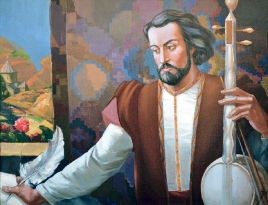Sayat-Nova
Tuesday, July 12, 2022
Sayat-Nova (born Harutyun Sayatyan; 14 June 1712 – 22 September 1795) was a Georgia-born Armenian poet, musician and ashugh, who had compositions in a number of languages.
The name Sayat-Nova has been given several interpretations. One version reads the name as "Lord of Song" (from Arabic sayyid and Persian nava) or "King of Songs". Others read the name as grandson (Persian neve) of Sayad or hunter (sayyad) of song. Charles Dowsett considers all these derivations to be unlikely and proposes the reading New Time (from Arabic sa'at and Russian nova) instead.
Sayat-Nova's mother, Sara, was born in Tiflis, and his father, Karapet, either in Aleppo or Adana. He was born in Tiflis. Sayat Nova was skilled in writing poetry, singing, and playing the kamancheh, Chonguri, Tambur. He lost his position at the royal court when he fell in love with the king's sister Ana; he spent the rest of his life as an itinerant bard.
In 1759 he was ordained as a priest in the Armenian Apostolic Church. His wife, Marmar, died in 1768, leaving behind four children. He served in locations including Tiflis and Haghpat Monastery. In 1795 he was killed in Haghpat Monastery by the invading army of Agha Mohammad Khan Qajar, the Shah of Iran. Agha Mohammad Khan demanded that Sayat Nova convert from Christianity to Islam, which he refused to do, considering it tantamount to 'turning Turk' and declaring his religion is undeniably Armenian Christian. Hence he was promptly executed and beheaded. He is buried at the Armenian Cathedral of Saint George in Tbilisi.
In Armenia, Sayat Nova is considered a great poet who made a considerable contribution to the Armenian poetry and music of his century. Although he lived his entire life in a deeply religious society, his works are mostly secular and full of romantic expressionism.
About 220 songs have been attributed to Sayat-Nova, although he may have written thousands more. Sayat Nova had also written some poems moving between all three.





